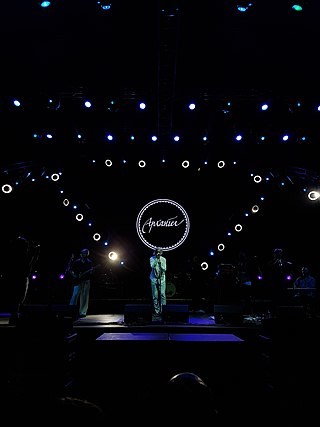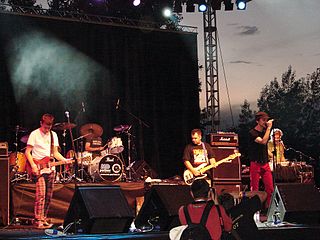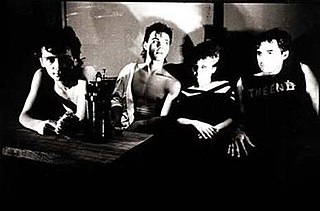
The Macedonian music refers to all forms of music associated with ethnic Macedonians. It share similarities with the music of neighbouring Balkan countries, yet it remains overall distinctive in its rhythm and sound.
Mizar is a Macedonian rock band from Skopje. They achieved a status of a cult band, especially in Macedonia and across the former Yugoslavian countries.
New wave in Yugoslavia was the new wave music scene of the Socialist Federal Republic of Yugoslavia. As its counterparts, the British and the American new wave, from which the main influences came, the Yugoslav scene was also closely related to punk rock, ska, reggae, 2 Tone, power pop and mod revival. Some of its acts are also counted as belonging to the Yugoslav punk scene which already existed prior to new wave. Such artists were labeled as both punk rock and new wave.

Arhangel is a Macedonian alternative rock band formed in 1989. The frontman is Risto Vrtev who has also been part of such rock bands as Mizar and Inola X. The original line-up is: Risto Vrtev, Dragan Ginovski, Panta Džambazoski (drums) and Dejan Argirovski. Arhangel has released five albums which have been met with both critical and commercial success. The band's sound is both muscular and melodic at the same time, echoing post-punk icons such as the English The Smiths and the Serbian Ekaterina Velika, while the band's lyrical inspirations focus is on the country's political and cultural changes during the 1990s. The band is also associated with the art movement Makedonska Streljba during the 1980s and the 1990s.

Obojeni Program is a Serbian alternative rock band from Novi Sad. The band are pioneers of the Serbian alternative rock scene. The first letters of the band's first seven studio albums form an acronym of their home town. They have performed at every Exit festival since the first in 2000, with the exception of the virtual Exit held in September 2020.
Sanatorium is a thrash metal band from Skopje, North Macedonia. It consists of Pero Stefanovski, Konstantin Kačev (guitar), Goran Stanković and Goran Atanasov (drums).
Cilindar is a new wave, ska, 2 Tone and reggae band from Skopje, North Macedonia formed in the early 1980s, in the then SR Macedonia.
Punk rock in Yugoslavia was the punk subculture of the former Socialist Federal Republic of Yugoslavia. The most developed scenes across the federation existed in the Socialist Republic of Slovenia, the Adriatic coast of the Socialist Republic of Croatia, the Socialist Autonomous Province of Vojvodina and Belgrade, the capital of both Yugoslavia and the Socialist Republic of Serbia. Some notable acts included: Pankrti, Paraf, Pekinška patka, KUD Idijoti, Niet, Patareni and KBO!.
Popular music in Yugoslavia includes the pop and rock music of the former SFR Yugoslavia, including all their genres and subgenres. The scene included the constituent republics: SR Slovenia, SR Croatia, SR Bosnia and Herzegovina, SR Montenegro, SR Macedonia and SR Serbia and its subunits: SAP Vojvodina and SAP Kosovo. The pop and rock scene was a part of the general Music of Yugoslavia, which also included folk, classical music, jazz etc. Within Yugoslavia and internationally, the phrases ex-YU or ex-Yugoslav Pop and Rock both formally and informally generally to the SFRY period, though in some cases also to its successor the FR Yugoslavia including Serbia and Montenegro which existed until 2006.
Generacija 5 is a Serbian and Yugoslav rock band formed in Belgrade in 1977.
Badmingtons were a prominent Macedonian punk rock band.
Aleksandar Makedonski was a Macedonian and former Yugoslav rock band.

La Strada was a Serbian and former Yugoslav new wave and later alternative rock band from Novi Sad.
Propaganda was a Yugoslav new wave band formed in Belgrade in 1981. Formed by former Zvuk Ulice and Bulevar members, Propaganda released only one album, Apatija javnosti, and disbanded. After the group ended its acitivty, Propaganda guitarist and vocalist Kokan Popović continued his career with the band Idoli, where he was soon joined by Propaganda bass guitarist Branko Isaković. Despite being short-lived, Propaganda was a prominent act of the Yugoslav new wave scene.

Luna was a Serbian and former Yugoslav post-punk/gothic rock band from Novi Sad.

U Škripcu was a Yugoslav rock band formed in Belgrade in 1980.

Dah was a Yugoslav and later Belgian progressive rock band formed in Belgrade in 1972.

Albanian rock describes music in Albania, Kosovo, North Macedonia and other Albanian-inhabited areas closely related to western rock. It has a wide variety of subgenres like pop rock, alternative rock, hard rock and metal.

September was a Slovenian and Yugoslav rock band formed in Ljubljana in 1975.

Slobodan "Boba" Stefanović was a Serbian and Yugoslav singer and songwriter. He was one of the leading stars of the Yugoslav pop scene in the 1970s.










